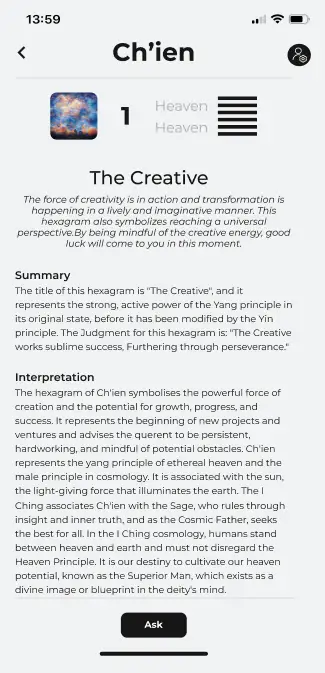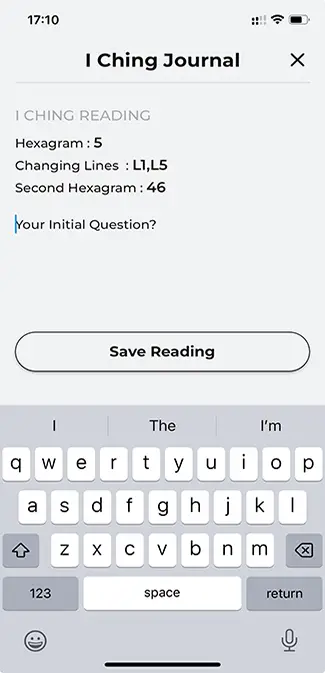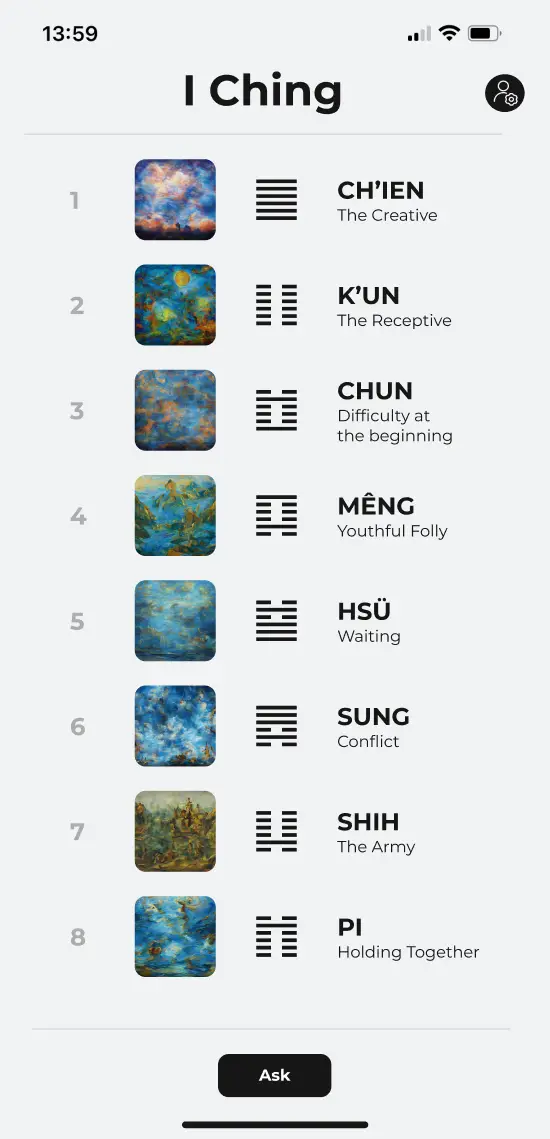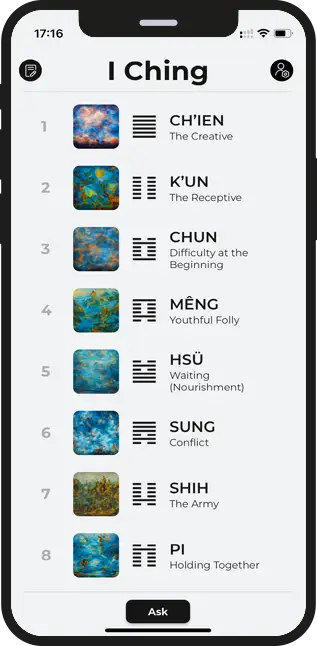
Thunder
Water
Hexagram 40 - Deliverance - HSIEH
Overcoming obstacles and difficulties often requires a change in attitude. It is essential to let go of resistance and surrender to the natural flow of life rather than trying to control outcomes. Being open and adaptable to new possibilities allows one to find a way through obstacles.
Summary
Hexagram 40, also known as Deliverance, represents the release from difficulties and struggles. It symbolises liberation and the ability to escape from negative situations. The key takeaways from the judgment of this hexagram include being aware of the timing for a change, being able to let go of the past and move forward, and being open to new opportunities. The image of the hexagram is that of the wind blowing over a lake, symbolising nature's power to clear away obstacles.
Interpretation
Represents a time of Deliverance from danger, tensions, and difficulty. It symbolises liberation and releases from the struggles holding you back. The movement in this hexagram is upward, away from danger, indicating that it is time to let go of the past and move forward towards new opportunities.
The hexagram is a reminder to be mindful of the timing of a change and to trust that the right moment will come. It advises us to be open to new possibilities and not to cling to old ways of thinking or acting. This is a sign that the time has come to let go of the past and embrace the new.
Symbolically, the wind blowing over a lake represents the power of nature to clear away obstacles and bring new beginnings. The I Ching teaches us that a change in our attitude always causes Deliverance. Conflicts and barriers are used to teach us lessons that we refuse to learn more easily, but they only darken our doorstep until we have acknowledged the lesson. So long as we ignore or resist difficulty, it remains our constant companion; as soon as we accept its presence as a sign that some self-correction is needed, our Deliverance begins.
Once our Deliverance begins, the I Ching teaches us that we have several responsibilities. The first is to forgive the misdeeds of others. The image of the hexagram is that of a powerful rainstorm washing away what is unclean. This is a time to clean every slate and begin anew, meeting others halfway with gentleness and patience.
Next, we are advised to restore our inner balance and see that it is maintained. Deliverance offers us a return to equanimity, and we must conscientiously avail ourselves of the opportunity. This requires us to stay true to ourselves and maintain our integrity in adversity. We must be mindful of our actions and decisions and remain focused on our goals.
Finally, we are counselled not to try to force progress, even though the time is beneficial. If we have truly changed our attitude, we have become detached, innocent, modest, and accepting. In this state, we allow progress to unfold naturally according to the will of the Sage. We need to trust in the natural course of things and avoid clinging to the past or becoming fixated on short-term obstacles.
Overall, Hexagram 40 is a powerful reminder of forgiveness, inner balance, and trust in the natural course of things. It teaches us that Deliverance is possible if we let go of the past and embrace the new. We can rise above our difficulties and find liberation with the right attitude.
Sage Advice
Recognise that true Deliverance comes from within and requires a deep commitment to self-reflection and self-improvement. This hexagram emphasises the importance of changing one's attitude and letting go of old habits and attachments that no longer serve our highest good. It is a reminder that true liberation is not achieved by external circumstances or material possessions but rather through an inner transformation that leads to greater clarity, wisdom, and compassion.
Line 1
Conveys a sense of success and relief. It suggests that a problematic situation has been resolved and that we have achieved inner harmony and clarity. The line reassures us that we have done the right thing and have nothing to be ashamed of. We don't believe that we are to blame for any mistakes or misunderstandings that may have arisen in the past. This line also reminds us of the importance of maintaining a sense of inner stillness and calm in the face of change. It advises us to avoid becoming too attached to any particular outcome and to remain open to new possibilities. We should be patient and persistent in our efforts and trust that the right opportunities will present themselves when the time is right. Overall, the first line suggests that success and Deliverance are possible when we maintain an attitude of inner peace and openness to new experiences. We can avoid new conflicts and obstacles and move forward with confidence and grace by remaining still and centred.
Line 2
Suggests that the key to Deliverance lies in identifying and overcoming false ideas that flatter our egos. These ideas may appear practical and well-balanced, but they ultimately hinder our progress and keep us under their spell. By cultivating sincerity and a devotion to what is truly correct, we can strip away the flattery and expose the false nature of these ideas. This clears the way for good fortune and paves the path to true Deliverance.
Line 3
The I Ching warns against the temptation to become arrogant and proud after being delivered from a problematic situation. It is natural to feel a sense of relief and to want to relax and enjoy the benefits of Deliverance. Still, it is essential not to let this turn into complacency or a sense of superiority over others. This kind of attitude can lead to a humiliating fall, as it indicates a loss of modesty and an overestimation of one's abilities. Instead, the I Ching advises staying alert and maintaining inner independence so that we can continue to have the correct effect and not be caught off guard by new challenges. The lesson here is that true Deliverance requires humility and a willingness to continue to work and grow rather than simply basking in our success.
Line 4
Suggests that to achieve Deliverance, one must free themselves from inferior influences within themselves and in their relationships. Inferior influences can manifest in various ways, including old habits or attitudes, negative self-talk, and toxic relationships. These bad influences can cloud our judgment and prevent us from seeing the truth clearly, hindering our progress towards Deliverance. The reference to the "great toe" implies a dependence on what is familiar and comfortable, even if it is not serving us well. This can manifest in various ways, including our relationships with others, our career choices, and even our daily routines. By recognising and letting go of these harmful influences, we can make room for the superior to enter our lives and guide us towards greater wisdom and understanding. Overall, the fourth line advises us to be mindful of our choices and let go of anything holding us back. By remaining detached and following the truth as we see it, we can achieve Deliverance and move towards a more fulfilling and meaningful life.
Line 5
Firm determination and a strong will are necessary to overcome entrenched habits of mind. One must resist the persuasive arguments that support these habits and refuse to listen to their voice. This takes courage and clarity of thought, but it is the only way to release oneself from their grip. It is vital to remain calm and detached from our emotions in an external situation to act with clarity and precision. It is necessary to be completely firm about what is right just so there is no argument. The fifth line of the hexagram represents a turning point in the journey towards Deliverance. The text suggests that only the superior person can truly deliver themselves from their difficulties. This is because the superior person possesses the inner strength and wisdom necessary to resist the temptation of negative habits and attitudes. They have the clarity of mind and heart to see what is truly right and just and the courage to act on that knowledge. To achieve Deliverance, one must be willing to let go of the past and embrace the new. This requires an open mind and willingness to let go of old thinking and behaviour patterns. It is necessary to develop the courage to face one's fears and confront the challenges that lie ahead. By doing so, one can move forward with a sense of purpose and direction and experience the freedom and joy that comes with true Deliverance.
Line 6
Advises us to let go of our ego and seek the help of the Sage to achieve Deliverance. It emphasises the importance of acknowledging and releasing any remnants of pride that may still hold us back. When we can humble ourselves and seek the guidance of the Sage, we can overcome the obstacles that stand in our way and find true freedom. The line also speaks to the importance of having the correct viewpoint in our relationships with others. Sometimes, to truly unite with someone, we must first let them go and release any resistance we may be holding onto. By doing so, we can remove the obstructing element and allow the natural flow of life to guide us towards our goals. In essence, the sixth line reminds us that true Deliverance can only be achieved when we are willing to let go of our ego, seek guidance from the Sage, and approach our relationships with the proper perspective.








